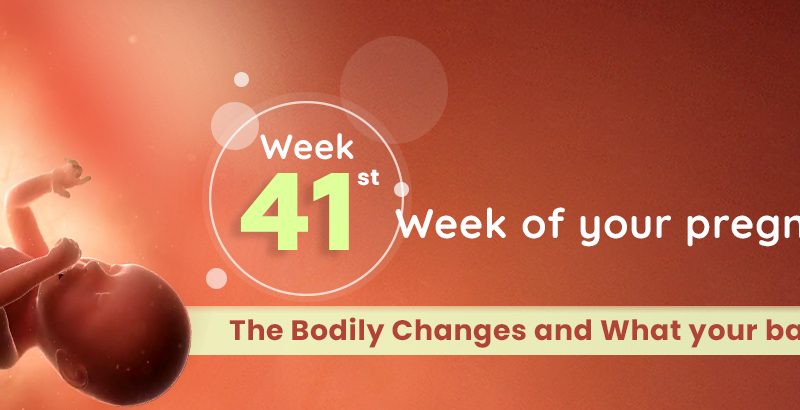Everything You Need To Know

Your entire pregnancy journey has been a blend of physical as well as emotional changes. With every passing stage of your pregnancy, you eagerly wait to hold your baby in your arms.
By the time you enter the 39th or 40th week of your pregnancy, it’s about time to bring your baby into your world.
But, there’s a possibility that even after crossing the 39th or 40th week, your baby may not show any sign of coming out of your womb. You may feel anxious about this stage of your pregnancy, but when you visit the doctor, you’ll feel that there’s nothing to worry about. They may want to stay in there a little longer!
You’ve crossed the 40th week and entered the 41st. You’re overdue.
Around 5 in 100 babies may be overdue (post-term) and that is quite normal.
However, you’d still need to be aware of the changes that’ll take place in you and the life you’re nurturing inside.
How Your Baby’s Changing in the 41st Week of Your Pregnancy
Seems like your baby has opted for a late checkout. But your baby is developing at this stage. So, when you visit your healthcare practitioner at this stage, the doctor will take you through a few tests. So, these tests include:
- Foetal movement counting to keep track of the foetal movement – the kicks and jabs
- The Non-stress test combined with a biophysical profile to check the foetal heart health (See whether the foetal heart rate is increasing) and to see the overall health of the baby
- The ultrasound scans to get a clear image of the tissues, organs, and blood vessels of your baby.
- The Doppler flow study is to see whether the foetus is growing normally inside the uterus. The Doppler test along with the ultrasound waves measures the developing baby’s blood flow.
These tests will further take you through the various other internal and external physical details of your baby. The changes are as follows:
Your Baby’s Size and Weight
By this week, your baby is fully developed. The baby is about 48-56cm in length, and weighs around 3.2-4.1kg. That’s quite impressive. Isn’t it? They may be slightly larger than a pumpkin or watermelon. If you happen to give birth to your baby now, there are chances that your baby is larger than the gestational age.
The Baby’s Skin
Even two weeks’ ago, the foetus was covered with vernix (the waxy coating protecting skin in amniotic fluid). By this week, your baby has grown quite big and has shed most of the vernix. After the shedding of the vernix, your baby’s skin will appear rough, dry, delicate, peeling, and wrinkled. (If your child is born this week, the hospital staff will give him or her the first bath to wash away the leftover vernix coating. Within a few days your newborn will look chubby)The skin will also change colour at this stage. It will be pink or red in colour.
The Baby’s Physical Changes
The baby’s head or skull has been soft enough to squeeze through the birth canal, ready to make a move out of your womb. But, at this stage, the skull bones have become hard. (If you happen to give birth at this stage, the medical experts would need additional medical instruments to pull the baby out) The baby’s hair (part of the skull or head) has become thick and coarse. As far as the other organ development of your baby is concerned, at this stage, the nervous system, lungs, brain, and the other circulatory systems are matured and ready to be born.
After all, both you and your baby are getting ready for the biggest moment of your life.
How is Your Body and Mind Changing in the 41st Week of Your Pregnancy?
While gearing up for the “Big Day”, the baby’s endocrine system is responsible for sending signals to the placenta to release hormones to trigger labour.
The onset of labour may be physically and emotionally uncomfortable for you at this stage. But you can’t deny that either. (Even during childbirth, your baby is going to release stress hormones to help them survive outside your womb.)
However, you might have 41st-week pregnancy discomforts just like the prior weeks of your pregnancy, which you need to be aware of.
So, the changes that you can see in yourself inside and outside at this stage of your pregnancy are:
Discomfort and Pain in the Pelvic Region and Lower Back
Your baby has developed healthily by now and has dropped down towards the birthing canal, making you feel the pressure and unbearable pain on the vagina, cervix, and bladder. You’ll feel a dull pain in the back.
Frequent Bathroom Visits
Since your baby has descended into your pelvis region with the head on the bladder, the bladder pressure will increase thus making you feel the urge to visit the bathroom quite often. That said, your urge to pee will be more than before. Even if you sneeze, there are chances for you to leak.
Haemorrhoids (piles)
Due to the baby’s weight on the pelvis region and rectum, you might experience painful haemorrhoids or piles. According to research, 40% of women during pregnancy suffer from haemorrhoids and anal fissures.
Cervix Dilation and Effacement
as the little human is gradually making a move outside the uterus, opening and thinning the cervix, your provider will take you through an internal test to check how much the cervix has dilated (opened) and effaced (thinned). For some of you, the cervical ripening is a slow process, however, for some of you it can happen overnight.
Water Breaking
That’s the onset of labour. Sometimes there’s only a slow leakage or a big gush of fluid coming out. During pregnancy, a foetus is kept safe and cushioned with the amniotic fluid. When the labour begins, the amniotic membrane ruptures. You might have to contact your practitioner immediately if you notice this. As you might have to give birth very soon. In the hospital, the practitioner will be able to recognise the stages of labour – Active, Transitional, and Full Dilation. (See to the 40th week to check the stages of labour). When the pain becomes unbearable for you the doctor may also push anaesthesia and epidural to make the area feel numb.
Enlarged Breasts and Colostrum Leakage
During your pregnancy, the breasts have been developing, and by the end of the pregnancy journey, the breasts start leaking colostrum. Colostrum is the first milk when you hold the newborn in your arms.
Along with the above-mentioned changes, you might feel swollen, hot, tired as well as stressed out, anxious, and sleep-deprived (pregnancy insomnia being common throughout) before you welcome your baby into your world. You might even get the nesting instinct or might feel like cleaning up. But, since your baby has arrived, your breathing will become easier than before.
Why Should Labour be Induced at this Stage of Your Pregnancy and How?
In certain cases, the labour may start naturally, however, in other cases, the healthcare practitioner may use medical and natural methods to induce labour, as the baby is taking his or her own time to come out of your womb.
The doctor may also suggest a labour induction process keeping you and your baby’s mental and physical health in mind. If the labour isn’t induced, the placenta responsible for foetal development may not function properly.
- The various medical labour induction methods are:
- Oxytocin Administration (This will help in inducing labour within 30 minutes)
- The healthcare practitioner might also give you prostaglandin gels to start contractions easily.
- The natural labour induction methods
The time for labour starts depending on how your body is going to respond to labour inducing methods. So, take it easy while you wait for your labour to begin, and don’t forget the healthy regimes to deal with this week’s pregnancy symptoms.
- Stay active so that you don’t have to wait long for labour to start. Keep performing Kegels if you can. That’s going to keep your labour pain less. Brisk-walking can also help. Also, find relief from haemorrhoid pain with a sitz bath.
- Being intimate with your partner. Also, let your partner understand your impending labour feelings, and enlist all your wishes while you’re going into labour.
- Taking an acupuncture can be sense of relief
- There is no miracle meal to induce labour, but you can have anything spicy to induce labour
- Try to get as much rest as possible. After all, you will need a lot of energy for labour, as well as the delivery of your baby.
- Keep your hospital bags packed. Don’t forget to carry your cord blood collection kit in the bag, if you’ve decided to bank your baby precious cord blood stem cells in the cord blood bank of your choice. They help in treating over 80 life – threatening diseases.
When you’ve crossed the 40th week of your pregnancy, and entered the 41st, it is understandable that your stress and tension is going to mount. This happens especially when you are going to become a mother for the first time. But keeping a fixed appointment with your doctor for labour induction is essential. Also keeping yourself preoccupied may be with online shopping and group discussion about your would-be baby, and educating yourself about this last stage of pregnancy and post-partum can be very helpful. Hope you have stress-free childbirth and may you give birth to a healthy child.


